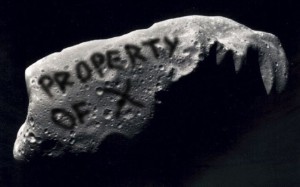Last week an American Venture called Planetary Resources, Inc unveiled a plan to send a fleet of spaceship into near space to review the possibility of mining on asteroids.
Apparently there are thousands of asteroids close enough to make them attractive as they hold treasures worth fortunes in the form of platinum and other metals of the same group.
Precious metals are not the only riches available however, and strangely enough plans are afoot to look for water. Water is an important material in space flight, because it can be used to produce the hydrogen and oxygen needed to power rockets, so an asteroid could represent a kind of modern day re-fueling station. This could make space travel cheaper because once rockets had left the atmosphere they could be refueled in space, eliminating the need to carry the excess weight during lift off.
All of this is in the future of course, but the project has plenty of backing from among others Larry Page of Google and filmmaker James Cameron.
These unfolding events bring some tricky questions however regarding the exploitation rights of near space objects. At the moment there is actually a subsection of international law called Space Law, governed by the Outer Space Treaty that was signed in 1967.
The writers did not envisage such monumental strides in technological advancement however and although the treaty makes clear that States cannot take celestial bodies as their own, they do retain jurisdiction and control over the object if they are the first to land on it.
A precedent has already been set as articles collected in Space have already been sold to private bidders by the Russian government. An article in this week’s wired goes into much greater detail.
It all looks a bit far fetched at times but supporters claim that the idea is no stranger than deep sea drilling for oil. It reminds me somewhat of the great gold rush events in the US of covered wagons and horses, only this time the means of transport differ and the digging is done by machine. Or maybe they will bring back entire asteroids and break them up on Earth, we will just have to wait and see. This article offers a glimpse at some possibilities.
There are obviously plenty of technological improvements required before any of this becomes concrete, but also a lot of legal and ethical issues need to be addressed. As ever one thing is certain, there’s big money in it for someone if it can be done!

4 thoughts on “Asteroid Mining”